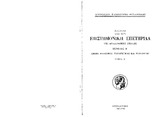| dc.contributor.author | Kargopoulos, Phillipos V. | |
| dc.date.accessioned | 2020-09-04T10:10:01Z | |
| dc.date.available | 2020-09-04T10:10:01Z | |
| dc.date.issued | 1988 | |
| dc.identifier.issn | 1105-5413 | |
| dc.identifier.uri | http://hdl.handle.net/11728/11552 | |
| dc.description.abstract | I am investigating here the possibility of predicates being
ontologically fundamental in the sphere of the practical. I shall
therefore, attempt to reconstruct as favourably as I can Moore's
theory of the «good» as a predicate. My aim is to critically approach
the characterization of «good» as standing for an indefinable,
simple, non-natural, intuited property. I shall argue that
GOOD may be indefinable, yet it cannot be simple. On the basis
of this critique, I shall offer three alternative theories that might
be able to account for the indefinability of «good» without falling
Into the error of considering GOO D to be a simple property. | en_UK |
| dc.language.iso | en | en_UK |
| dc.publisher | Αριστοτέλειο Πανεπιστήμιο Θεσσαλονίκης | en_UK |
| dc.relation.ispartofseries | Ανάτυπο από την Επιστημονική επετηρίδα της Φιλοσοφικής Σχολής Θεσσαλονίκης. Τμήμα Φιλοσοφίας Παιδαγωγικής και Ψυχολογίας. Περίοδος Β΄;τ. 1ος, σ. 51-82, Θεσσαλονίκη, 1985-1988 | |
| dc.rights.uri | http://creativecommons.org/licenses/by-nc-nd/4.0/ | en_UK |
| dc.subject | Research Subject Categories::SOCIAL SCIENCES::Social sciences::Psychology | en_UK |
| dc.subject | Good | en_UK |
| dc.subject | predicate | en_UK |
| dc.title | The "Good" as a predicate | en_UK |
| dc.type | Article | en_UK |


